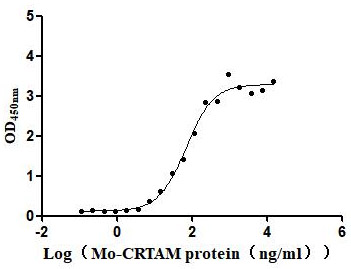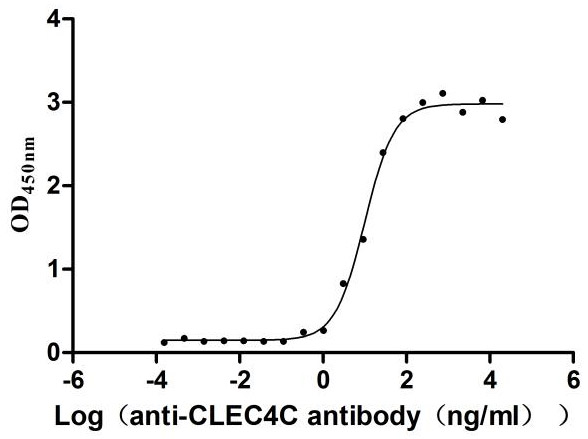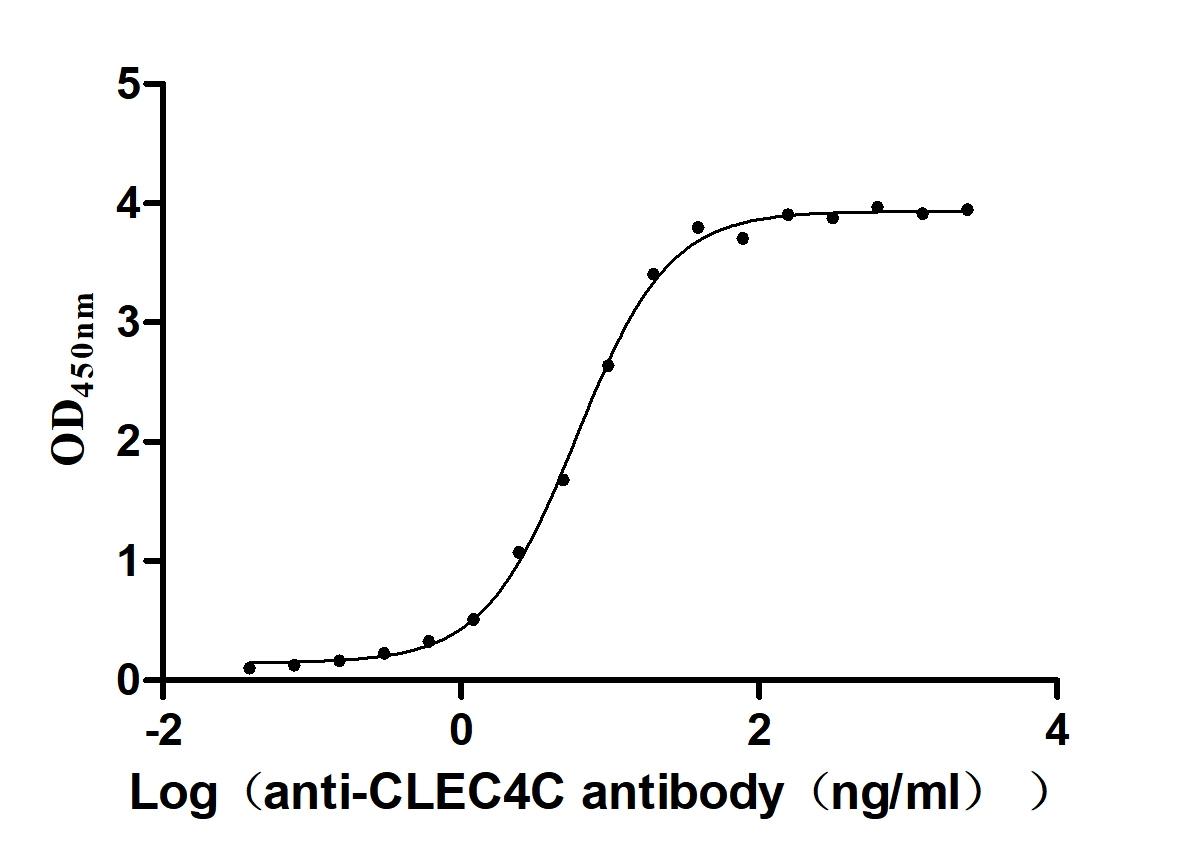Recombinant Human Transcription factor HES-1 (HES1)
-
货号:CSB-YP622769HU
-
规格:
-
来源:Yeast
-
其他:
-
货号:CSB-EP622769HU
-
规格:
-
来源:E.coli
-
其他:
-
货号:CSB-EP622769HU-B
-
规格:
-
来源:E.coli
-
共轭:Avi-tag Biotinylated
E. coli biotin ligase (BirA) is highly specific in covalently attaching biotin to the 15 amino acid AviTag peptide. This recombinant protein was biotinylated in vivo by AviTag-BirA technology, which method is BriA catalyzes amide linkage between the biotin and the specific lysine of the AviTag.
-
其他:
-
货号:CSB-BP622769HU
-
规格:
-
来源:Baculovirus
-
其他:
-
货号:CSB-MP622769HU
-
规格:
-
来源:Mammalian cell
-
其他:
产品详情
-
纯度:>85% (SDS-PAGE)
-
基因名:
-
Uniprot No.:
-
别名:bHLHb39; C-HAIRY1; c-hairy1A; Class B basic helix-loop-helix protein 39; FLJ20408; Hairy and enhancer of split 1 (Drosophila); Hairy and enhancer of split 1; Hairy homolog (Drosophila); Hairy homolog; Hairy like ; Hairy, Drosophila, homolog of; Hairy-like protein; Hairy/enhancer of split, Drosophila, homolog of, 1; HAIRY1; HES-1; hes1; Hes1 hairy and enhancer of split 1 (Drosophila); HES1_HUMAN; HHL; HL; HRY; MGC129109; OTTHUMP00000209031; RHL; Transcription factor HES-1
-
种属:Homo sapiens (Human)
-
蛋白长度:full length protein
-
表达区域:1-280
-
氨基酸序列MPADIMEKNS SSPVAATPAS VNTTPDKPKT ASEHRKSSKP IMEKRRRARI NESLSQLKTL ILDALKKDSS RHSKLEKADI LEMTVKHLRN LQRAQMTAAL STDPSVLGKY RAGFSECMNE VTRFLSTCEG VNTEVRTRLL GHLANCMTQI NAMTYPGQPH PALQAPPPPP PGPGGPQHAP FAPPPPLVPI PGGAAPPPGG APCKLGSQAG EAAKVFGGFQ VVPAPDGQFA FLIPNGAFAH SGPVIPVYTS NSGTSVGPNA VSPSSGPSLT ADSMWRPWRN
-
蛋白标签:Tag type will be determined during the manufacturing process.
The tag type will be determined during production process. If you have specified tag type, please tell us and we will develop the specified tag preferentially. -
产品提供形式:Lyophilized powder
Note: We will preferentially ship the format that we have in stock, however, if you have any special requirement for the format, please remark your requirement when placing the order, we will prepare according to your demand. -
复溶:We recommend that this vial be briefly centrifuged prior to opening to bring the contents to the bottom. Please reconstitute protein in deionized sterile water to a concentration of 0.1-1.0 mg/mL.We recommend to add 5-50% of glycerol (final concentration) and aliquot for long-term storage at -20℃/-80℃. Our default final concentration of glycerol is 50%. Customers could use it as reference.
-
储存条件:Store at -20°C/-80°C upon receipt, aliquoting is necessary for mutiple use. Avoid repeated freeze-thaw cycles.
-
保质期:The shelf life is related to many factors, storage state, buffer ingredients, storage temperature and the stability of the protein itself.
Generally, the shelf life of liquid form is 6 months at -20°C/-80°C. The shelf life of lyophilized form is 12 months at -20°C/-80°C. -
货期:Delivery time may differ from different purchasing way or location, please kindly consult your local distributors for specific delivery time.Note: All of our proteins are default shipped with normal blue ice packs, if you request to ship with dry ice, please communicate with us in advance and extra fees will be charged.
-
注意事项:Repeated freezing and thawing is not recommended. Store working aliquots at 4°C for up to one week.
-
产品描述:人HES1是一种转录因子,可以抑制其他基因的转录活性,参与许多细胞发育和分化过程。如果想要重组这种蛋白,可以按照以下步骤进行: 克隆HES1基因:可以使用PCR技术从人的基因组DNA中扩增HES1基因的开放阅读框(ORF)序列。此外,还需要添加一些启动子和标签序列,以便在表达过程中调节基因表达,并且可以方便地检测到蛋白质。 构建表达载体:将HES1基因插入表达载体中,可以选择一些经过验证的表达载体,如pET系列载体。这些载体中包含了一些促进蛋白表达的元件,如启动子、增强子、终止子等。 选择表达宿主细胞:可以选择一些常用的表达宿主细胞,如哺乳动物细胞,例如CHO细胞、HEK293细胞等,并在细胞中转染含有HES1基因的表达载体。这些宿主细胞中还需要添加一些辅助蛋白质,如转染脂质、抗生素等,以帮助蛋白质的正确折叠和纯化。 蛋白表达和纯化:在表达宿主细胞中诱导HES1蛋白的表达,并通过细胞破碎和离心等方法提取蛋白质。然后使用亲和层析、离子交换层析、凝胶过滤层析等方法对蛋白进行纯化。 蛋白质的鉴定和活性检测:使用SDS-PAGE、Western blot等方法对纯化后的HES1蛋白进行鉴定和定量。此外,还可以使用细胞实验等方法对HES1蛋白的生物活性进行检测,如检测其对其他基因的转录抑制作用。 ...显示更多
-
Datasheet :Please contact us to get it.
相关产品
靶点详情
-
功能:Transcriptional repressor of genes that require a bHLH protein for their transcription. May act as a negative regulator of myogenesis by inhibiting the functions of MYOD1 and ASH1. Binds DNA on N-box motifs: 5'-CACNAG-3' with high affinity and on E-box motifs: 5'-CANNTG-3' with low affinity. May play a role in a functional FA core complex response to DNA cross-link damage, being required for the stability and nuclear localization of FA core complex proteins, as well as for FANCD2 monoubiquitination in response to DNA damage. ...显示更多
-
基因功能参考文献:
- MiR-182 alleviates the development of cyanotic congenital heart disease by suppressing HES1 PMID: 30107165
- The results of this study demonstrate that HES1 is a specific downstream gene of NOTCH1 and that it contributes to SACC proliferation, apoptosis and metastasis. PMID: 29665790
- HES1 is mono-ubiquitinated in a Fanconi anemia core complex-dependent manner. PMID: 29463306
- Hes-1 knockdown promotes osteopontin expression in HUVECs and enhances OPN-induced angiogenesis. PMID: 28420872
- Our results suggest that KN promotes goblet cell differentiation by regulating Wnt, Notch, and AhR signals and expression of Hes1 and Hath1. PMID: 29436668
- In the present study, the s reported the first observation of Hes1 oscillatory expression in human neural progenitor /stem cells, with an approximately 1.5 hour periodicity and a Hes1 protein half-life of about 17 (17.6 +/- 0.2) minutes. Human cytomegalovirus infection disrupts the Hes1 rhythm and down-regulates its expression. PMID: 28451898
- A three-molecule score based on the expression of Notch pathway molecules: Jagged1, intracellular Notch1 (ICN1) and Hes1 (JIH score) to assess prognostic value in non-metastasis clear cell renal cell carcinoma (ccRCC). PMID: 27612417
- we demonstrate for the first time an essential role of HPV oncoprotein E6 that selectively overexpresses in CaCxSLCs and participates in maintenance of stem cell phenotype and stemness through upregulation of Hes1 while preponderance of E7 leads to differentiation. PMID: 26988248
- IE1 is involved in Hes1 degradation by assembling a ubiquitination complex and promoting Hes1 ubiquitination as a potential E3 ubiquitin ligase, followed by proteasomal degradation of Hes1. PMID: 28750047
- Notch signaling and Id2/3 regulate neurogenesis in a complementary manner and ID factors can induce neural stem cell maintenance and quiescence in the absence of Notch. PMID: 28974640
- The phenotype was rescued by ectopic expression of miRNA182-5p in Delta182 cells. A bioinformatic analysis and Hes1 modulation data suggested that Hes1 could be a putative target of miRNA182-5p. A reciprocal relationship between miRNA182-5p and Hes1 was seen in the context of TK inhibition PMID: 28079885
- These results suggest that HES1 promotes extracellular matrix protein expression and inhibits proliferative and migratory functions in the trabecular meshwork cells under oxidative stress, thereby providing a novel pathogenic mechanism underlying and a potential therapeutic target to primary open-angle glaucoma PMID: 28423527
- Hes1 disruption leads to tumor regression without perturbing normal stem cell homeostasis, preclinically validating Hes1 as a cancer therapeutic target. PMID: 28536281
- Low Hes1 expression is associated with left ventricle hypertrabeculation/non-compaction and Menetrier-like gastropathy. PMID: 28013292
- GPR146 has an antiviral role in fighting against viral infection, although the GPR146-mediated protection is eliminated by IRF3/HES1-signalling. PMID: 28464285
- In SNSCC, the subgroup of patients with high expression (5th quintile) of HES1 mRNA was associated with better survival (P = .04); however these patients with high expression of HES1 mRNA had also a more favorable tumor stage and grade and more unfavorable resections representing potential confounders. PMID: 27567696
- Loss of nuclear expression of Hes1 occurs in 83% of colorectal adenocarcinomas and is associated with female sex, right-sided location, BRAFV600E mutation, microsatellite instability, larger tumor size, and significantly worse survival. PMID: 27476040
- Hes1 plays a key role in acinar cell integrity and plasticity on cellular insults. PMID: 27639167
- miR-182 reveals its oncogenic capacity in medullary thyroid carcinoma by directly contributing to the invasive behavior through loss of the tumor suppressive HES1/Notch1 signaling circuit. PMID: 28122586
- Cells could therefore regulate the proportion of Wnt- and Notch-mediated control of the Hes1 promoter to coordinate the timing of cell fate selection as they migrate through the intestinal epithelium and are subject to reduced Wnt stimuli. Furthermore, mutant cells characterised by hyperstimulation of the Wnt pathway may, through coupling with Notch, invert cell fate in neighbouring healthy cells, enabling an aberrant cel PMID: 28245235
- We demonstrated that ZNF70 interacts with ZFP64 and activates HES1 transcription by binding to the HES1 promoter. In addition, HES1 gene expression is increased in ILDR2-knockdown HepG2 cells, in which ZNF70 is translocated from the cytoplasm to the nucleus, suggesting that ZNF70 migration to the nucleus after dissociating from the ILDR2-ZNF70 complex activates HES1 transcription. These results support a novel link betwee PMID: 27353377
- Results suggest that Hes1 plays an important role in the invasion and metastasis of NPC through inhibiting PTEN expression to trigger EMT-like phenotypes. PMID: 26452025
- High expression of Hes1 is associated with radiation resistance in pancreatic cancer. PMID: 27677287
- Low HES1 expression is associated with acute myeloid leukemia. PMID: 26678889
- Results provide functional and mechanistic links between Hes1 and Bmi-1/PTEN/Akt/GSK3beta signaling in the development and progression of colon cancer. PMID: 26452029
- HES1 DMROI methylation predicted differences in early infant behaviour, known to be associated with academic success. In vitro, methylation of HES1 inhibited ETS transcription factor binding, suggesting a functional role of this site. PMID: 25906782
- High Hes1 expression is associated with chronic myeloid leukemia. PMID: 25849484
- Suggest that loss of Hes1 could be used as a sensitive and specific marker to differentiate sessile serrated adenomas/polyps from hyperplastic polyps. PMID: 26448192
- OR1A1 activation suppresses hepatic triglyceride metabolism by modulating HES-1, PPARG, and mtGPAT expression. PMID: 25817041
- Decreased HES1 expression is associated with higher lung metastasis in hepatocellular carcinoma PMID: 25987042
- Pancreatic stellate cells promoted Hes 1 expression in both PANC-1 and BxPC-3 cell lines and induced chemoresistance to gemcitabine. High Hes 1 expression was seen in pancreatic cancer patients with shorter overall and progression-free survival times. PMID: 25672829
- Interference with Notch1 increased the expression level of Hes-1. PMID: 25920606
- The results from this study indicate that Hes1 plays a quantitative role in the development and progression of colon cancer and the maintenance of the stemness of cancer stem cells, which remains to be fully characterized. PMID: 24492635
- we summarize the recent data supporting the idea that Hes1 may have an important function in the maintenance of cancer stem cells self-renewal, cancer metastasis, and epithelial-mesenchymal transition (EMT) process induction PMID: 25781910
- overexpression of HES1 in primary AML cells inhibited growth of AML in a xenograft mice model. In conclusion, we demonstrated the tumor suppressor role of HES1 in AML. PMID: 26092281
- This study is the first report that elucidated the HES1 underexpression in ESCC and revealed its correlation with the invasiveness of ESCC. PMID: 25139105
- Hairy and Enhancer of Split 1 (HES1), a transcriptional repressor controlled by NOTCH1, is a critical mediator of NOTCH1-induced leukemogenesis strictly required for tumor cell survival. PMID: 25784680
- CPEB1 specifically suppressed the translation of HES1 and SIRT1 by interacting with a cytoplasmic polyadenylation element. PMID: 25216517
- Hes1 cooperated with CaMK2delta to modulate OA pathogenesis through induction of catabolic factors, including Adamts5, Mmp13, Il6, and Il1rl1 PMID: 25733872
- Hes-1 protein expression was gradually increased from normal to dysplasia to oral carcinoma, revealing Hes-1 role in the progression of oral cancer. PMID: 25037575
- Hes1 suppresses acute myeloid leukemia development through FLT3 repression. PMID: 25234168
- HES1 has a role in metastasis and predicts poor survival in patients with colorectal cancer PMID: 25636905
- Hes1 oscillation sustains a dynamic proliferation state that is well adapted for versatile fate decisions in both single- and two-cell neural progenitor systems. PMID: 25605780
- This study revealed that Notch signaling-related molecules (including Notch1, Hes1, and others) are expressed in L929 and MRC-5 cells and that Notch signaling regulates the expression of col1alpha1 and col1alpha2 in both cell lines. PMID: 25107895
- The tumor suppressor function of LSAMP is most likely exerted by reducing the proliferation rate of the tumor cells, possibly by indirectly upregulating one or more of the genes HES1, CTAG2 or KLF10. PMID: 24885297
- In prostate tumors, the overexpression of PTOV1 was associated with decreased expression of HEY1 and HES1, and this correlation was significant in metastatic lesions. PMID: 24684754
- the present results revealed, for the first time, that Hes-1 could be SUMO-modified by PIAS1 and GADD45alpha is a novel target of Hes-1 PMID: 24894488
- Data indicate that chronic myelogenous leukemia blast crisis showed that MMP-9 was highly expressed in three, with two exhibiting high levels of HES1 expression. PMID: 24825862
- Notch signaling can directly downregulate MUC5AC promoter activity through Hes1-dependent mechanisms. PMID: 23860410
- Hes1 upregulation contributes to the development of FIP1L1-PDGRA-positive leukemia in blast crisis. PMID: 24486648
收起更多
-
亚细胞定位:Nucleus.
-
数据库链接:
HGNC: 5192
OMIM: 139605
KEGG: hsa:3280
STRING: 9606.ENSP00000232424
UniGene: Hs.250666

















